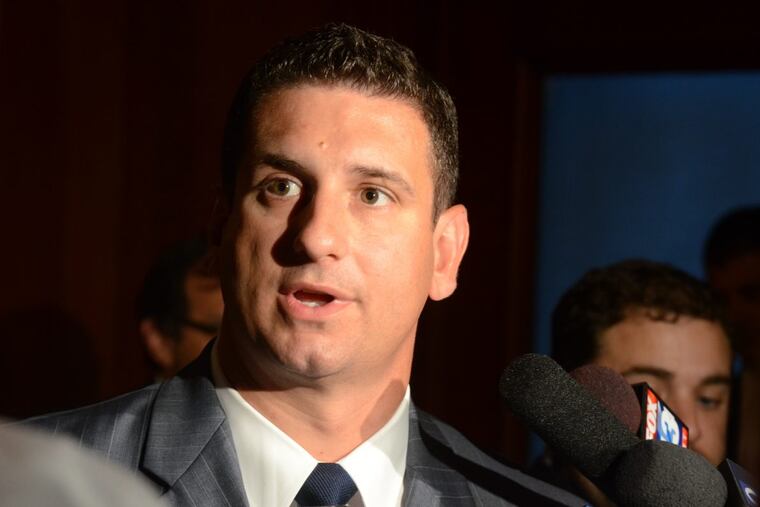'No agreements' on how to pay for Pa. budget, GOP House leader says
In a memo Thursday to Republican members of the House, Reed said "no agreements" have been reached on any of the outstanding - and now six days overdue - pieces of the state budget.

HARRISBURG — Where Senate President Pro Tempore Joe Scarnati (R., Jefferson) may see a glass half-full when it comes to a deal on how to pay for the state budget, House Majority Leader Dave Reed (R., Indiana) sees an empty glass.
In a pointed memo Thursday to Republican members of the House, Reed said "no agreements" have been reached on any of the outstanding — and now six days overdue — pieces of the state budget. His sobering tone stood in contrast to the hint of optimism expressed a day earlier by Scarnati. In an interview with the Associated Press, Scarnati signaled that negotiators were close to an agreement on a key sticking point: how much to expand gambling in the state.
Reed's memo painted a gloomier picture.
House Republicans, Reed told his members, will work toward a compromise, but will not "completely abandon our perspectives in favor of the other parties."
"The sooner everyone comes to this realization, the sooner this process will be complete," Reed wrote.
Nonetheless, Reed said the House would be in session Friday to begin working on bills related to the $31.99 billion spending plan passed by the Republican-controlled legislature last week, and which is now sitting on Gov. Wolf's desk. The legislation lays out only what the state can spend, but not how to pay for it.
The Senate is scheduled to convene Saturday.
Negotiators continued talks Thursday, but again emerged with no hard-and-fast agreements on how to close last fiscal year's $1.5 billion shortfall, while also paying for this fiscal year's. The new fiscal year began July 1.
Complicating matters: Standard and Poor's on Thursday said it was placing Pennsylvania on a negative "creditwatch" that reflects the state's "eroding financial position and our view that there is a significant likelihood that the commonwealth will not enact a structurally balanced budget for fiscal 2018," according to a statement by the credit rating agency.
Wolf, a Democrat, and Senate Republicans have said they would consider borrowing money to cover the shortfall. House Republicans have not said whether they agree with that idea.
All sides have also squabbled over further expanding gambling and further privatizing the sale of wine and hard liquor. On the gambling front, much of the fight has centered on whether to legalize up to 40,000 video gaming terminals (VGTs) — described as similar to slot machines — in bars, taverns, and other establishments with a liquor license.
In the interview, Scarnati suggested that VGTs would not be part of any final deal. House Republicans had a different takeaway.
"It's not off the table," Steve Miskin, Reed's spokesman, said Thursday.
The VGT fight aside, negotiators have discussed whether to tax so-called games of skill, which legislative officials said currently are not regulated and don't provide any income for state coffers. They are different from VGTs, which are considered pure games of chance, in that some level of human skill is involved in winning.
It is not clear how many games of skill there are in Pennsylvania currently, or how much the state could raise by taxing them.
Also under discussion is a proposal put forth by Wolf in February, when he unveiled his blueprint for a state budget, according to one negotiator familiar with the talks: expanding the state's 6 percent sales tax to certain items or services that are currently exempt. It was not clear Thursday which industries could see their exemptions disappear.
Also under consideration is a plan to allow more private sales of wine and hard liquor. That issue is near and dear to House Republicans, who have pushed for years to wrest control of wine and hard-liquor sales from the state Liquor Control Board.
Last year, Wolf signed into law a GOP-backed bill allowing licensed grocery stores to sell wine, among other changes to the state's liquor laws, some of which date back to the end of Prohibition.